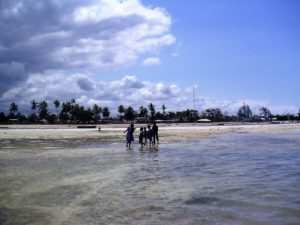All actors are needed to reach the goal but especially women are a key starting point
maricela (at) natgeo.su.se

Woman and children on a seagrass bed at low tide, Tanzania. Photo: Maricella de la Torres-Castro
In my recent article, I used the concept of inclusive management to represent “any management strategy that consciously and explicitly considers gender and the whole diversity of actors” dealing with coastal/ocean issues. It is not enough to have just thoughts and good intentions. Gender value has to be there, written in the plans.
The contribution lifts up the idea to make it explicit and to integrate gender analysis in the management process, making it relevant and a strong force to achieve sustainability. The basic argument is straightforward: without the inclusion of all actors in the system; we are not going to advance towards sustainability for them all. The work adds to the many efforts trying to highlight that for coasts/oceans sustainability is not only a “men’s world” issue but is also a women’s, children’s, elders’, etc. issue.
Gender analysis is an excellent way to study how a variety of actors use, care, protect, manage, and govern the coastal/ocean space. Many studies have shown that women are key actors in the coasts/oceans worldwide and therefore women should be a critical starting point to analyze actor diversity and their perspectives and needs offer possible solutions. The article presents why including women and gender might render positive results, and further how to include gender analysis in the wider management and governance process. A hands-on generic model and method are presented so scientists, managers or policy makers can start thinking about actor diversity and gender integration. The generic model is presented in detail and hopefully it is a contribution to advance the work with gender and coastal/ocean sustainability on the ground!
In brief, the model is built on layers of knowledge. It starts with characterization of the seascape and the resource users, a gender analysis, integrating the information, tailoring management plans to achieve environmental sustainability and social justice, implementing and then iterating through evaluation and improving the layers of information and process.
In addition to the generic model and methods, I present an example of how it could be applied by using the case study of small-scale fisheries associated with seagrasses in Zanzibar, Tanzania. In the coastal areas including seagrass meadows, management plans dealt mainly with the work of men and finfish fishing among corals, whereas women’s invertebrate collection in seagrass meadows raised important conservation concerns not being addressed. Women’s fishing activities affected seagrass conservation but they were vital for the women’s economic survival. Local management actions that would be needed for seagrass conservation therefore need to grapple with the issues of poverty as they are deeply intertwined with gender issues in tropical seagrasses settings. This is just one example of how an inclusive management approach reveals important social and conservation issues that must be addressed for addressed to achieve sustainability.
This month we celebrated World Ocean day and its theme on gender with efforts that contribute to a better ocean state. Have a look at the paper and become hands on! The paper shows strong positive reasons for including gender because it produces a clear method and explains how to proceed.
Full reference:
de la Torre-Castro, M. 2019. Inclusive Management Through Gender Consideration in Small-Scale Fisheries: The Why and the How. Front. Mar. Sci., 29 March 2019. https://doi.org/10.3389/fmars.2019.00156
This entry was posted in: Country, Fisheries, Marine Fisheries, Tanzania, Women
